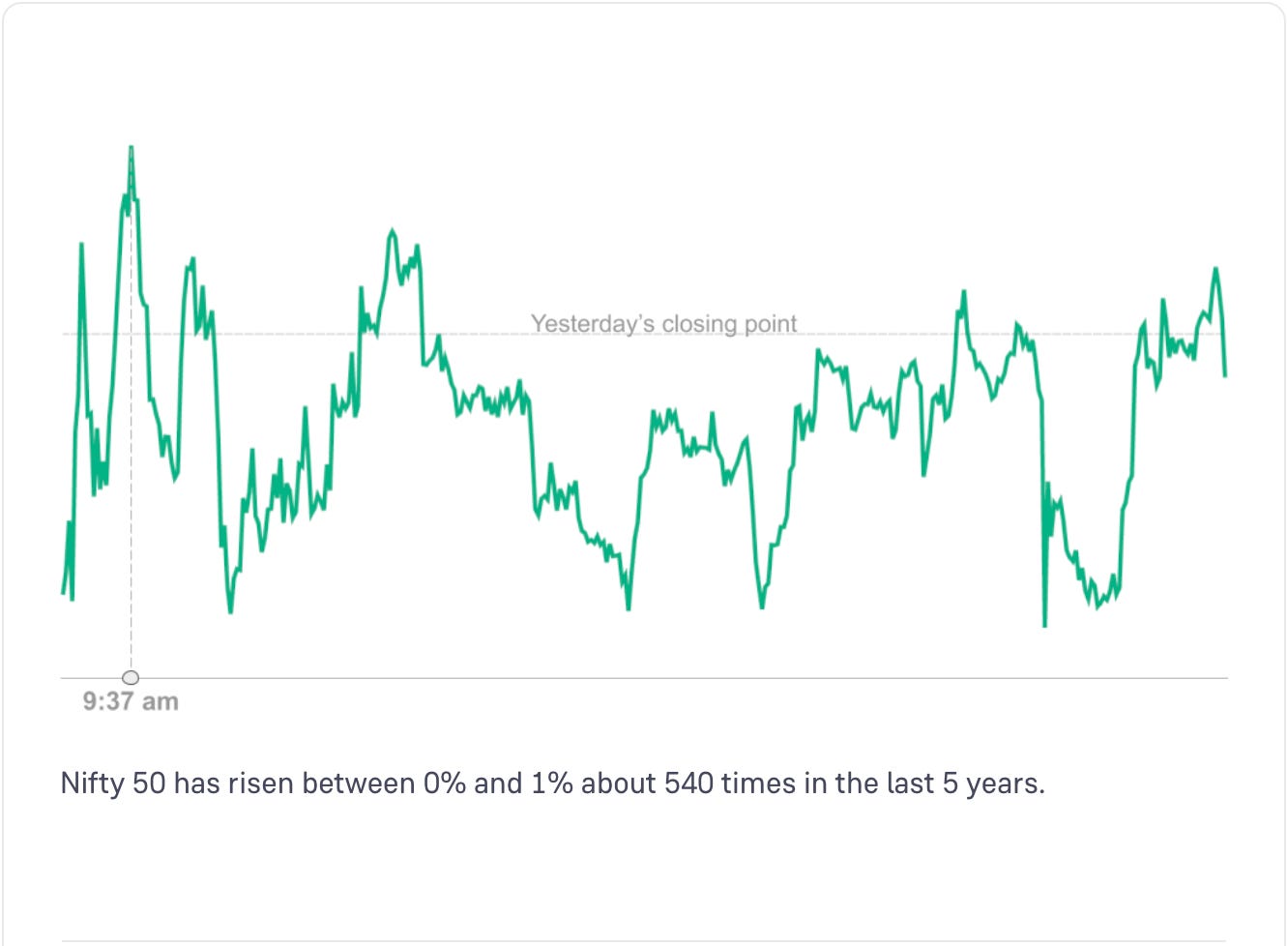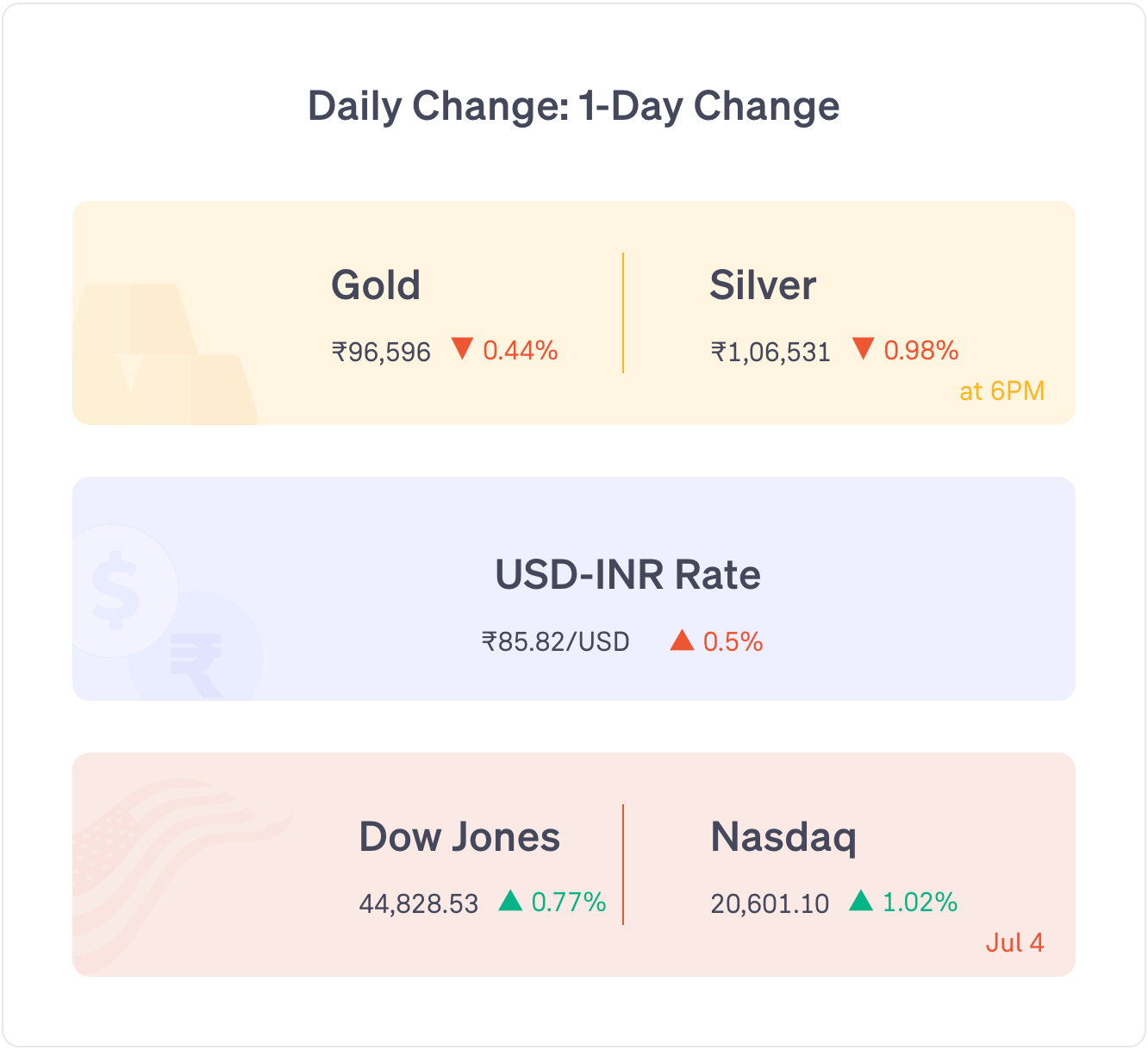Markets opened below Friday’s closing point.
Nifty 50 touched its highest point at 9:37 AM and was volatile throughout the day.
FMCG stocks rose the most today. Media stocks and IT stocks fell the most.
Global markets: US markets and European markets rose. Asian markets showed a mixed trend.
News
Automobile retail sales rose 4.84% year-on-year to 20 lakh units in June. 2-wheeler rose 4.73%, 3-wheeler rose 6.68%, commercial vehicle rose 6.6%, and passenger vehicle sales rose 2.45%: FADA.
Jindal (India) received Odisha government's approval for a new Rs 3,600 crore steel plant to produce 9.6 lakh metric tonnes steel products annually by 2027.
Travel Food Services IPO has been subscribed 0.10 times. Retail subscription: 0.14 times. Open for subscription till 9 July.
Stocks Updates
Eicher Motors: fixed 1 August as the record date for Rs 70 per share dividend announced earlier for FY 2024-25.
Suzlon: received NSE and BSE approvals for merging its subsidiary Suzlon Global Services and reorganize reserves to clean up past losses.
JSW Energy: commissioned 261 MW of renewable energy, out of which 189 MW is solar, 72 MW is wind energy capacity.
Pidilite: fixed 23 July as the record date for Rs 20 per share dividend announced earlier for FY 2024-25.
Titan: company’s consumer business (domestic + international) rose 20% year-on-year in the April-June quarter. Within domestic businesses, jewellery rose 18%, watches and wearables rose 23%, and eyecare rose 12%.
Cochin Shipyard: signed an MoU with South Korea’s HD Korea Shipbuilding to jointly explore shipbuilding ventures.
Word of the Day
Insolvency
It is when a company is not able to pay back its loans or other debts on time.
It happens due to various reasons like poor financial decisions, unexpected expenses, lower earnings, etc.
An insolvent company can approach its lenders to restructure its debts, or raise more loans to repay its current debts.
Insolvency can also lead to bankruptcy, in which the company sells its business to repay its dues.
'Insolvent' is also used to refer to a person or a government that is not able to pay back its dues on time. 'Insolvency' is not just limited to companies.
6 Day Course
Theme: Warren Buffett’s checklist
Day 1: Monday
One of the best ways to learn to pick stocks is to understand how the best investors invest their money.
This week we will explore Warren Buffett’s style.
He has not published a dedicated list of traits he looks for but he has spoken about many of his checks.
One of the first things Warren Buffett looks for is if he understands the business.
He prefers simpler businesses. Complex businesses are more difficult to understand and track.
After that, he worries if the company has room to expand. If it is operating in a market where it can grow the number of its customers, he considers it a good business.
If the company has already saturated the market, there’s not much room left for growth.
Featured Question
Q. “How does valuation matter when buying or selling stocks ?”
Think of it like 'price'.
Let’s say you are trying to buy a house. In the area you are trying to buy a house in, a 2BHK costs Rs 70 lakh.
The house you like used to cost Rs 72 lakh. But now the owner is asking for Rs 90 lakh while the price of other houses in the area is still around Rs 70 lakh.
Would you buy it?
Mostly likely no.
You will find it overpriced. You might expect the owner to reduce the price to 'correct' levels. So you will wait.
Now, imagine you bought this house for Rs 90 lakh and the next month, its market price falls to Rs 70 lakh.
This is mainly why valuation is important. You do not want to pay a higher price than the fair price. It can lead to losses — even if the asset is good.
Just as with buying a house, there are many nuances to this.
No matter what, some really good houses are always more expensive than the houses in the same neighbourhood.
Again, how expensive is okay and how much is 'too much'?
This depends on the individual case.
On the other hand, if you manage to buy a stock at a price lower than it should be, you can make a lot more money than buying only at the fair/correct price.
Similarly, when you sell the shares is also important.
If you sell when it is overvalued, you can make good money since you are exiting the investment at a much higher point.
On the other hand, even if you bought a good company at a fair price, and if you end up selling when it is undervalued, you can end up losing money.
This is assuming the companies’ revenues and profits remain steady and growing.
Did you like this edition?
Leave a feedback here!






